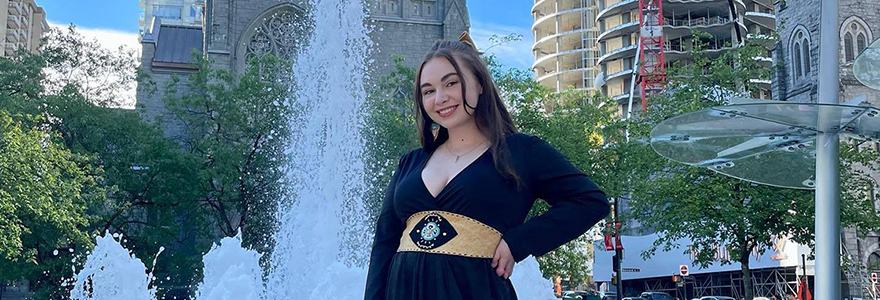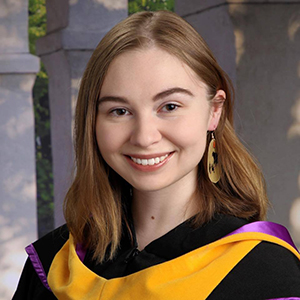Feature: Returning home to help
 By Ashley Rabinovitch
By Ashley Rabinovitch
Laney Beaulieu will never forget a particular guest lecture delivered by an Indigenous physician at the Schulich School of Medicine & Dentistry during her first year of medical school.
“He talked about how there were so many times he felt like giving up, but he couldn’t because there was no one standing behind him to take his place,” she remembers. “I realized that’s how I feel. That's what motivates me.”
Numerous challenges. Limited options.
Beaulieu, a member of the Dene and Métis people, grew up more than 4,000 kilometres from London, Ontario, in a small community in the Northwest Territories called Denı́nu Kų́ę. Situated on the south shores of Great Slave Lake, the hamlet is home to approximately 400 people.
She was raised by her grandmother, who staffed the local nursing station for close to 40 years. Without any physicians or hospitals nearby, the nursing station played a vital role in meeting the immediate health needs of the community.
Like in many remote communities, fresh produce is hard to come by in Denı́nu Kų́ę, and what is available can be prohibitively expensive.
“We’re not a wealthy community, so when people have a choice between a bag of nectarines or 100 bags of chips, they’re going to buy the chips,” says Beaulieu. Combine these nutritional challenges with the rapid shift from an active to sedentary lifestyle within one or two generations, and it’s no wonder that a sizable percentage of the population suffers from diabetes and heart disease, she reflects.
In the event of an emergency, nurses have no other option but to call Med Response, which triages requests and sends a medivac plane to transport patients to the territorial hospital in Yellowknife, a seven-hour drive from Denı́nu Kų́ę. If a case is low on the triage list, this process can take up to two days. There is a small hospital an hour and a half’s drive from Denı́nu Kų́ę, but it is only staffed by physicians half the time.
Beaulieu was “practically raised in the nursing station,” she remembers, and she knew from an early age that she wanted to follow in her grandmother’s footsteps. Though there were not any opportunities for a physician to live and practice in Denı́nu Kų́ę, Beaulieu made a plan to attend medical school out of province before moving to Yellowknife for a permanent position in family medicine. From there, she reasoned, she could travel back to Denı́nu Kų́ę and surrounding communities to augment the efforts of nurses like her grandmother.
After completing an undergraduate degree in medical science and biology at Western, Beaulieu was grateful for the opportunity to remain in London for her medical degree.
“I became very connected to the Indigenous community in London, and the Indigenous Services Centre at Western offered a lot of support,” she says. “It was hard to imagine a better environment to continue my education.”
Diving into Discovery Week

Every first-year medical student at Schulich School of Medicine & Dentistry participates in Discovery Week, a program designed to introduce them to rural and regional medicine. The Office of Distributed Education facilitates placements for most students within more than 60 rural regional communities within Southwestern Ontario, but Beaulieu received a special exemption to complete her Discovery Week placement in the Northwest Territories.
For one week at Stanton Territorial Hospital in Yellowknife, she learned alongside physicians and healthcare practitioners in primary care, labour and delivery, and emergency medicine—the three areas of responsibility of every family doctor at the hospital.
“It was surreal to have this opportunity, because it’s exactly what I want to do in the future,” Beaulieu reflects. “While I was familiar with the healthcare system in the Northwest Territories, I had never worked in a hospital here before.”
Beaulieu embraced the frenzied pace of care at the hospital, making careful note of the specific challenges she will one day face. Because the hospital is short-staffed, patients often face long wait times and crowded facilities. Healthcare professionals must also rely less on timely laboratory services than their counterparts in better-resourced provinces.
Dispelling myths
Beaulieu is hopeful that Discovery Week will correct misconceptions about rural and remote medicine and persuade more of her classmates to think of practicing medicine in these areas.
“I’ve found that for many of the people I know, rural medicine is not even on their radar,” she says. “Many expect it to be boring, like they will see the same thing over and over. But that couldn’t be further from the truth. You end up working far beyond your scope of practice and seeing rare, amazing cases every day.”
Vanessa Stratton, the Associate Director for Integrated Medical Education (Southwestern Ontario), is enthusiastic about helping students discover untapped opportunities through Discovery Week. “For many students, it isn’t until they gain hands-on experience in rural regional communities that their eyes are opened to the immediate, life-changing impact they can make," she says.
While she would like to see more people join her in practicing medicine in the Northwest Territories, Beaulieu is committed to filling the gaps however possible. As a native daughter of the region, she sees herself well-suited to meeting the needs of her neighbours.
“High-quality care relies on positive physician-patient relationships,” she says. “If you don’t trust each other, it doesn’t work. As someone the community already knows and trusts, I’m looking forward to returning home to help. If I don’t do it, no one will.”









